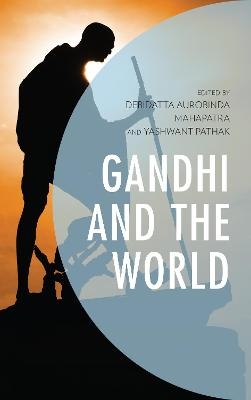
Gandhi and the World
Lexington Books (Verlag)
978-1-4985-7639-0 (ISBN)
The book revisits Gandhi in this era of turbulence. As rigidly held notions and practices fall to pieces, and as mechanisms of violence and politicking fail, Gandhi comes to picture. If Gandhi could change the course of history, there must be elements in his thought and action, which need re-examination for the benefit of human society. This collection of essays seeks to address the question: Is it possible to generate Gandhian optimism and faith in truth and nonviolence in the contemporary world? It argues that there is a need for sustained efforts to make an in-depth study of Gandhian principles to address global problems. The book is a useful addition to the literature in political science and international relations, economics, history, sociology, conflict and peace studies, and a guide for the advocates of peaceful means of conflict resolution.
Debidatta Aurobinda Mahapatra is the director of Mahatma Gandhi Center for Non-Violence, Human Rights and World Peace at Hindu University of America. Yashwant Pathak is professor and associate dean for faculty affairs at the College of Pharmacy, University of South Florida (USF).
Acknowledgments
Introduction: Revisiting Gandhi, by Debidatta Aurobinda Mahapatra and Yashwant Pathak
Chapter 1: Two Worlds: Gandhi and the Modern World, by Johan Galtung
Chapter 2: Mahatma Gandhi, International Relations and War, by Debidatta Aurobinda Mahapatra
Chapter 3: The Future of Humanity between War and Peace, by Abdelwahab Hechiche
Chapter 4: Satyagraha and the Bodhisattva Way: Spiritual Training for Personal and Political Liberation Today, by Frank M. Tedesco
Chapter 5: Swaraj as Blossoming and Satyagraha as Co-Realizations: Compassion, Confrontation and a New Art of Integration, by Ananta Giri
Chapter 6: “God is not in Temples, so it doesn’t Matter Who Enters Them”: Jiddu Krishnamurti’s Critique of Gandhi’s Ahimsa principle, and the Problem of Advaita-based Ethics, by Richard Grego
Chapter 7: The Concept of Non-violence in the Thinking of Leo N. Tolstoy and Mahatma Gandhi: Utopia or Reality? By Anna Hamling
Chapter 8: Sustainable Development and Tribal Populations: Spiritual and Gandhian Approach, by Ravi Bhatia
Chapter 9: Beyond Intolerance: Policies for Ethnic Communities Assimilation in India: A Gandhian Perspective, by Bina Sengar
Chapter 10: Applicability of Gandhian Principle of Non-violence in the Ethno-religious Conflicts among Hindu Community of North Carolina, USA, by Narayan Khadka
About the Contributors
Appendix A: A Message from Tulsi Gabbard, the United States Congresswoman
Appendix B: A Message from Ela R. Bhatt, Chancellor, Gujarat Vidyapith
| Erscheinungsdatum | 10.05.2021 |
|---|---|
| Co-Autor | Debidatta Aurobinda Mahapatra, Yashwant Pathak, Johan Galtung |
| Verlagsort | Lanham, MD |
| Sprache | englisch |
| Maße | 159 x 239 mm |
| Gewicht | 445 g |
| Themenwelt | Geisteswissenschaften ► Philosophie ► Östliche Philosophie |
| Sozialwissenschaften ► Politik / Verwaltung ► Allgemeines / Lexika | |
| Sozialwissenschaften ► Politik / Verwaltung ► Europäische / Internationale Politik | |
| Sozialwissenschaften ► Politik / Verwaltung ► Politische Systeme | |
| Sozialwissenschaften ► Politik / Verwaltung ► Staat / Verwaltung | |
| ISBN-10 | 1-4985-7639-7 / 1498576397 |
| ISBN-13 | 978-1-4985-7639-0 / 9781498576390 |
| Zustand | Neuware |
| Haben Sie eine Frage zum Produkt? |
aus dem Bereich


